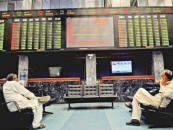Oil edges up but still set for big weekly loss on demand worries
Weak US services sector, jobs growth data add to worries about global oil demand

Weak US services sector, jobs growth data add to worries about global oil demand. PHOTO: REUTERS
Benchmark Brent crude rose $0.43, or 0.7%, to $58.14 a barrel by 1000 GMT, while US West Texas Intermediate (WTI) crude futures rose $0.23, or 0.4%, to $52.68.
But Brent was down 6% on the week while US crude was 5.7% lower, on the biggest weekly losses since July.
"Both are on track for hefty weekly losses and it will take a brave man to bet against the bearish tide," Stephen Brennock of oil broker PVM said.
"As things stand, demand and supply-side developments are anything but supportive and there can be no happy ending for those of a bullish disposition," he added.
Weak US services sector and jobs growth data on Thursday added to worries about global oil demand and exacerbated fears that a protracted US-China trade war could push the global economy into a recession.
Investors are awaiting US non-farm payrolls data due out on Friday to determine the next move.
"Given that US growth is largely supported by a buoyant consumer whose confidence is built on a strong job market, this release will be critical in shaping expectations around future Fed policy which will have spillover effects on oil markets," said Harry Tchilinguirian, global oil strategist at BNP Paribas.
US job growth likely picked up in September, with wages increasing solidly, which could assuage financial market concerns that the slowing economy was teetering on the brink of a recession.
Saudi Arabia's Energy Minister, Prince Abdulaziz bin Salman, said on Thursday the world's top crude oil exporter had fully restored oil output after attacks on its facilities last month knocked out more than 5% of global oil supply.
"The fact that Saudi restored its production back to original capacity sooner than expected means investors had to price out raised supply risks at a faster clip than would have otherwise been the case," said Fawad Razaqzada, market analyst at futures brokerage Forex.com.
He said weak economic data, particularly from US manufacturing sector, also raised fears for oil demand, "but now that some of these factors have been priced in, oil prices may fall less sharply going forward or at best start to form a base."


















COMMENTS
Comments are moderated and generally will be posted if they are on-topic and not abusive.
For more information, please see our Comments FAQ